Tradition
SIGNIFICANCE OF ‘SIXTEEN’ IN OUR CULTURE

1. Solah Shringar are the sixteen adornments of a woman done on the bride. 2.Shodasha Upachara Pooja is sixteen steps of pooja, detoxification and attending to a guest at home. 3. Shiva is worshipped in Chaturmas as the sixteen Monday … Continue reading
SIGNIFICANCE AND TYPES OF CONCH SHELL (SHANKHA)
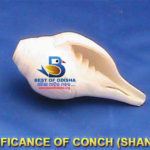
The conch shell is a major Hindu article of prayer, used as a trumpet and in order to get rid of negative energy and evil spirits. It is also used as a container for holy water ( shankha jala ). … Continue reading
OMM
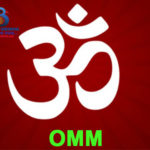
OMM: Sanskrit letters or symbol for the “sacred” Hindu sound Omm (Ohm or Aum) called “the mother of all mantras. … Omm or Aum is of paramount importance in Hinduism…. Omm is not a word but rather an intonation, which, … Continue reading
SIGNIFICANCE OF MEHENDI (HENNA)
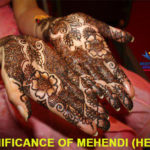
The art of applying henna in hands and feet is known as Mehndi and it is a very old custom and ancient art form of the Asian subcontinent. The propagators were the Mughals. The Mughals taught us all about the … Continue reading
SIGNIFICANCE OF NOSE RING
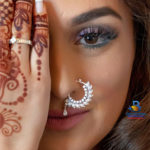
In the Indian culture the custom of wearing nose rings begin in the 16th century. It originated in the Middle East countries and became popular in India mainly during the Mughal emperors rule. Nose ring is a very popular fashionable … Continue reading
SIGNIFICANCE OF EAR RING

Ear rings are thought to have originated in Asia and the Middle East. Historians believe that both hoop and pendant earrings date back to about 2000 BC. Pierced ear rings date back to ancient Egypt around 1500 BC. Origin of … Continue reading
SIGNIFICANCE OF ANKLET (PAUNJI / PAYAL)
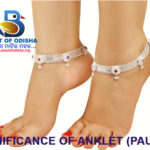
Anklets have a long and rich history in the world. Over the years, women from many cultures used ankle bracelets to create a sexy appearance, show their wealth, signal marital status, attract a suitor, and attract attention to their lovely, … Continue reading
SIGNIFICANCE OF MANGALSUTRA
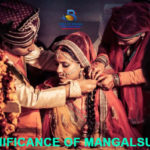
As per Hindu Dharma, mangalsutra is an ornament of a woman denoting her married status. Each person makes a mangalsutra for the bride as per his capacity. If it is not possible to make a mangalsutra with a cord of … Continue reading
SIGNIFICANCE OF SINDOOR
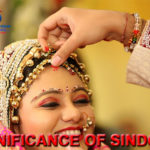
Sindooor or vermillion holds lot of importance in Indian society. The tradition of application of sindoor in the parting of hair by married Hindu women is considered extremely auspicious and is being carried on since centuries. Symbolic of Married Hindu … Continue reading






